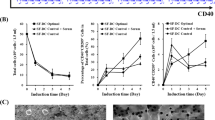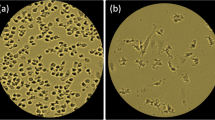Abstract
There is increasing interest in the generation of dendritic cells (DC) for cancer immunotherapy. In order to utilize DC in clinical trials it is necessary to have standardized, reproducible and easy to use protocols. We describe here the process development for the generation of DC as the result of investigation of culture conditions as well as consumption rates of medium and cytokines. Our studies demonstrate that highly viable DC (93 ± 2%) can be produced from CD14+ enriched monocytes via immunomagnetic beads in a high yield (31 ± 6%) with X-VIVO 15, 400 U ml−1 GM-CSF and 2000 U ml−1 IL-4 without serum and feeding. For the maturation of DC different cocktails (TNF-α, IL-1β, IL-6, PGE2 and TNF-α, PGE2) were compared. In both cases cells expressed typical surface molecules of mature DC and induced high proliferative responses in mixed lymphocyte reactions which led to IFN-γ producing T-lymphocytes. The data suggest that the use of this optimized, easy to use protocol results in highly mature DC.
Similar content being viewed by others
References
Banchereau J. and Steinman R.M. 1998. Dendritic cells and the control of immunity. Nature 392: 245–252.
BenderA., SappM., Schuler G., Steinman R.M. and Bhardwaj N. 1996. Improved methods for the generation of dendritic cells from nonproliferating progenitors in human blood. J. Immunol. Meth. 196: 121–135.
Berger T., Feuerstein B., Strasser E., Hirsch U., Schreiner D., Schuler G. and Schuler-Thurner B. 2002. Large-scale generation of mature monocyte-derived dendritic cells for clinical application in cell factories. J. Immunol. Meth. 268: 131–140.
Bernard J., Ittelet D., Christoph A., Potron G., Adjizian J.C., Kochman S. and Lopez M. 1998. Adherent-free generation of functional dendritic cells from purified blood monocytes in view of potential clinical use. Hematol. Cell Ther. 40: 17–26.
Bohnenkamp H.R. and Noll T. 2002. Bioprocess development for the cultivation of human T-lymphocytes in a clinical scale. Cytotechnology 38: 135–145.
Caux C., Dezutter-Dambuyant C., Schmitt D. and Banchereau J. 1992. GM-CSF and TNF-alpha cooperate in the generation of dendritic Langerhans cells. Nature 360: 258–261.
Costello R.T., Gastaut J.A. and Olive D. 1999. Tumor escape from immune surveillance. Arch. Immunol. Ther. Exp. 47: 83–88.
Dhodapkar M.V., Steinman R.M., Krasovsky J., Munz C. and Bhardwaj N. 2001. Antigen-specific inhibition of effector T cell function in humans after injection of immature dendritic cells. J. Exp. Med. 193: 233–238.
DietzA.B., BulurP.A., EricksonM.R., WettsteinP.J., LitzowM.R., Wyatt W.A., Dewald G.W., Tefferi A., Pankratz V.S. and Vuk-Pavlovic S. 2000. Optimizing preparation of normal dendritic cells and bcr-abl+ mature dendritic cells derived from immunomagnetically purified CD14+ cells. J. Hematother. Stem Cell Res. 9: 95–101.
Dzionek A., Piechaczek C., Campbell J., Zysk M., Winkels G., Huppert V. and Schmitz J. 2002. Clinical-scale magnetic sorting and multiparamter analysis of dendritic cells aubsets and precursors. In: 7th International Symposium on Dendritic Cells, Bamberg.
Fong L., Hou Y., Rivas A., Benike C., Yuen A., Fisher G.A., Davis M.M. and Engleman E.G. 2001. Altered peptide ligand vaccination with Flt3 ligand expanded dendritic cells for tumor immunotherapy. Proc. Natl. Acad. Sci. USA 98: 8809–8814.
Goxe B., Latour N., Chokri M., Abastado J.P. and Salcedo M. 2000. Simplified method to generate large quantities of dendritic cells suitable for clinical applications. Immunol. Invest. 29: 319–336.
Guyre C.A., Fisher J.L., Waugh M.G., Wallace P.K., Tretter C.G., Ernstoff M.S. and Barth R.J. 2002. Advantages of hydrophobic culture bags over flasks for the generation of monocyte-derived dendritic cells for clinical applications. J. Immunol. Meth. 262: 85–94.
Jonuleit H., Kuhn U., Muller G., Steinbrink K., Paragnik L., Schmitt E., Knop J. and Enk A.H. 1997. Pro-inflammatory cytokines and prostaglandins induce maturation of potent immunostimulatory dendritic cells under fetal calf serumfree conditions.Eur. J. Immunol. 27: 3135–3142.
Kalinski P., Schuitemaker J.H., Hilkens C.M. and Kapsenberg M.L. 1998. Prostaglandin E2 induces the final maturation of IL-12-deficient CD1a+CD83+ dendritic cells: The levels of IL-12 are determined during the final dendritic cell maturation and are resistant to further modulation. J. Immunol. 161: 2804–2809.
Kikuchi T., Akasaki Y., Irie M., Homma S., Abe T. and Ohno T. 2001. Results of a phase I clinical trial of vaccination of glioma patients with fusions of dendritic and glioma cells. Cancer Immunol. Immunother. 50: 337–344.
Kobayashi T., Shinohara H., Toyoda M., Iwamoto S. and Tanigawa N. 2001. Regression of lymph node metastases by immunotherapy using autologous breast tumor-lysate pulsed dendritic cells: Report of a case. Surg. Today 31: 513–516.
Kugler A., Stuhler G., Walden P., Zoller G., Zobywalski A., Brossart P., Trefzer U., Ullrich S., Muller C.A., Becker V., Gross A.J., Hemmerlein B., Kanz L., Muller G.A. and Ringert R.H. 2000. Regression of human metastatic renal cell carcinoma after vaccination with tumor cell-dendritic cell hybrids. Nat. Med. 6: 332–336.
Luft T., Jefford M., Luetjens P., Toy T., Hochrein H., Masterman K.A., Maliszewski C., Shortman K., Cebon J. and Maraskovski E. 2002. Functionally distinct dendritic cell DC populations induced by physiologic stimuli: prostaglandin E2 regulates the migratory capacity of specific DC Subsets. Blood 100: 1362–1372.
Mackensen A., Herbst B., Chen J.L., Kohler G., Noppen C., Herr W., Spagnoli G.C., Cerundolo V. and Lindemann A. 2000. Phase I study in melanoma patients of a vaccine with peptide-pulsed dendritic cells generated in vitro from CD34(+) hematopoietic progenitor cells. Int. J. Cancer 86: 385–392.
Manz R., Assenmacher M., Pfluger E., Miltenyi S. and Radbruch A. 1995. Analysis and sorting of live cells according to secreted molecules, relocated to a cell-surface affinity matrix. Proc. Natl. Acad. Sci. USA 92: 1921–1925.
Nestle F.O., Alijagic S., Gilliet M., Sun Y., Grabbe S., Dummer R., Burg G. and Schadendorf D. 1998. Vaccination of melanoma patients with peptide-or tumor lysate-pulsed dendritic cells. Nat. Med. 4: 328–332.
O'Garra A. and Arai N. 2000. The molecular basis of T helper 1 and T helper 2 cell differentiation. Trends Cell Biol. 10: 542–550.
Patel S.D., Papoutsakis E.T., Winter J.N. and Miller W.M. 2000. The lactate issue revisited: Novel feeding protocols to examine inhibition of cell proliferation and glucose metabolism in hematopoietic cell cultures. Biotechnol. Prog. 16: 885–892.
PicklW.F., Majdic O., Kohl P., Stockl J., Riedl E., ScheineckerC., Bello-Fernandez C. and Knapp W. 1996. Molecular and functional characteristics of dendritic cells generated from highly purified CD14+ peripheral blood monocytes. J. Immunol. 157: 3850–3859.
Romani N., Gruner S., Brang D., Kampgen E., Lenz A., Trockenbacher B., Konwalinka G., Fritsch P.O., Steinman R.M. and Schuler G. 1994. Proliferating dendritic cell progenitors in human blood. J. Exp. Med. 180: 83–93.
Romani N., Reider D., Heuer M., Ebner S., Kampgen E., Eibl B., Niederwieser D. and Schuler G. 1996. Generation of mature dendritic cells from human blood. An improved method with special regard to clinical applicability. J. Immunol. Meth. 196: 137–151.
Sallusto F. and Lanzavecchia A. 1994. Efficient presentation of soluble antigen by cultured human dendritic cells is maintained by granulocyte/macrophage colony-stimulating factor plus interleukin 4 and downregulated by tumor necrosis factor alpha. J. Exp. Med. 179: 1109–1118.
Sallusto F. and Lanzavecchia A. 1999. Mobilizing dendritic cells for tolerance, priming, and chronic inflammation. J. Exp. Med. 189: 611–614.
Scandella E., Men Y., Gillessen S., Forster R. and Groetrp M. 2002. Prostaglandin E2 is a key factor for CCR7 surface expression and migartion of monocyte-derived dendritic cells. Blood 100: 1354–1361.
Schuler-Thurner B., Schultz E.S., Berger T.G., Weinlich G., Ebner S., Woerl P., Bender A., Feuerstein B., Fritsch P.O., Romani N. and Schuler G. 2002. Rapid induction of tumorspecific type 1 helper cells in metastatic melanoma patients by vaccination with mature, cryopreserved, peptideloaded monocyte-derived dendritic cells. J. Exp. Med. 195: 1279–1288.
Thurner B., Haendle I., Roder C., Dieckmann D., Keikavoussi P., Jonuleit H., Bender A., Maczek C., Schreiner D., von den Driesch P., Brocker E.B., Steinman R.M., Enk A., Kampgen E. and Schuler G. 1999a. Vaccination with mage-3A1 peptide-pulsed mature, monocyte-derived dendritic cells expands specific cytotoxic T cells and induces regression of some metastases in advanced stage IV melanoma. J. Exp. Med. 190: 1669–1678.
Thurner B., Roder C., Dieckmann D., Heuer M., Kruse M., Glaser A., Keikavoussi P., Kampgen E., Bender A. and Schuler G. 1999b. Generation of large numbers of fully mature and stable dendritic cells from leukapheresis products for clinical application. J. Immunol. Meth. 223: 1–15.
Zhou L.J. and Tedder T.F. 1995. Human blood dendritic cells selectively express CD83, a member of the immunoglobulin superfamily. J. Immunol. 154: 3821–3835.
Author information
Authors and Affiliations
Corresponding author
Rights and permissions
About this article
Cite this article
Bohnenkamp, H., Noll, T. Development of a standardized protocol for reproducible generation of matured monocyte-derived dendritic cells suitable for clinical application. Cytotechnology 42, 121–131 (2003). https://doi.org/10.1023/B:CYTO.0000015833.34696.03
Issue Date:
DOI: https://doi.org/10.1023/B:CYTO.0000015833.34696.03




